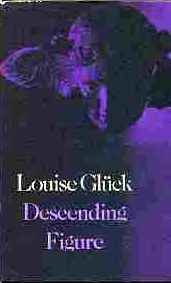Glück divides Descending Figure into three sections, “The Garden,” “The Mirror,” and “Lamentations,” though I cannot say that I found the division particularly helpful or enlightening. Certainly there is a lot of lamenting in the final section, but there is a lot of it in the rest of the collection as well. This is a book whose first poem is titled “The Drowned Children,” and it begins horrifyingly matter-of-factly: “You see, they have no judgment. So it is natural that they should drown…” Part of me wants to read this poem as a supernatural tale, with a non-human narrator puzzled that its listeners should feel anything strongly about the children’s deaths, explaining to its audience that something of the children remains, “And yet they hear the names they used/like lures slipping over the pond…” Part of me wants to read it in the voice of a grieving parent, going to pieces over the course of its three stanzas. Part of me wants to just reject it entirely, especially the second stanza’s start: “But death must come to them differently/so close to the beginning.”
I suspect my first reaction is a large part of the reason I find myself sliding off of Glück’s poems so often. I’m reminded of what Jo Walton wrote about the ending of Middlemarch: “…Dorothea’s story at least ends happily, if unconventionally. That is, unconventionally for a Victorian novel. She doesn’t get to be the ambassador to Jupiter, more’s the pity.” My sensibility would find it perfectly natural for a character to be ambassador to Jupiter. I suspect that Glück has firm ideas (or at least had them when she was writing these poems more than 40 years ago) about who her narrators are and who their audiences are, and I’m willing to bet there’s not a member of the Jovian diplomatic corps among them. More’s the pity.
There could be. In various poems in this collection gods are invoked; statues’ immobility is remarked upon unfavorably, perhaps they could be persuaded to move about a bit and bring some liveliness. In the poem that gives its title to the first section of Descending Figure — and indeed in a sub-part of that poem with the same name, the garden is personified, but how much more would I have related to the poem if it turned out the garden could speak? Instead it just admires the poem’s undefined “you,” and “smears itself with green pigment/ … so that you will come to it with your lovers.” Glück remains resolutely mundane, while I try to read her poems into a much wilder work, and so we connect rather poorly.

